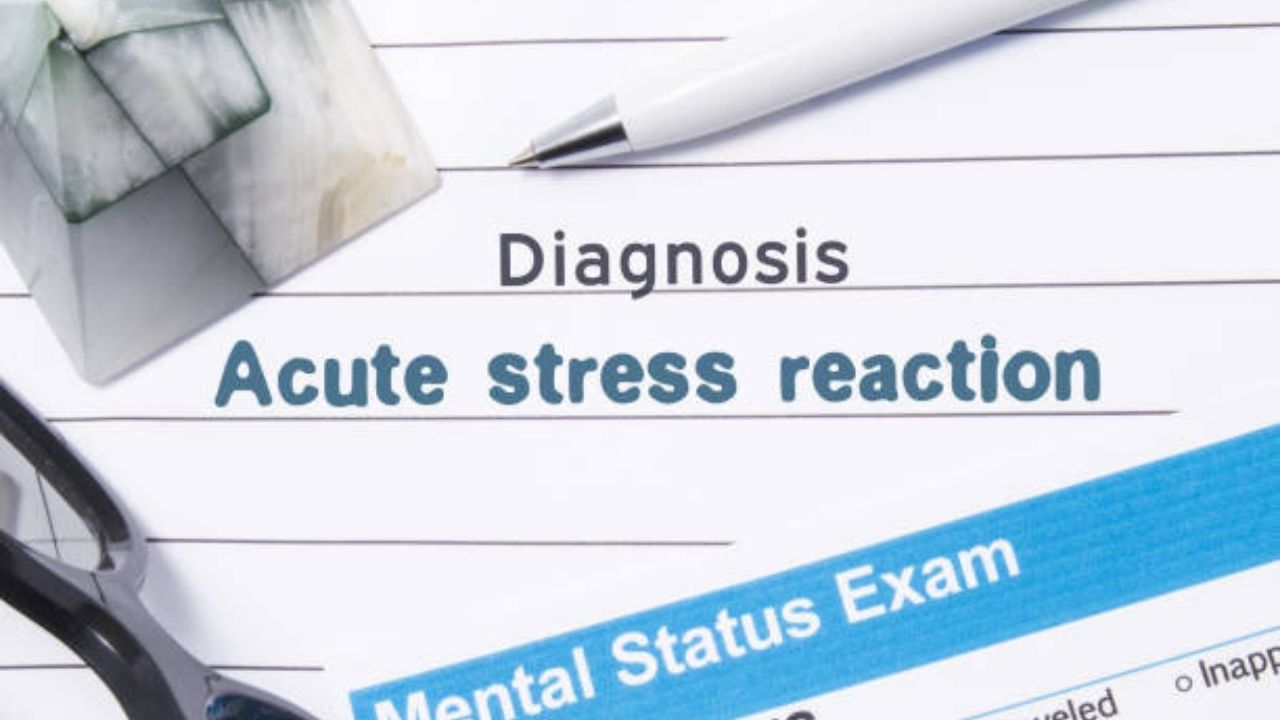An acute stress reaction, also known colloquially as a nervous breakdown, is triggered by a traumatic event. The patients suffer, for example, from memory gaps, nightmares or tachycardia. If the symptoms last longer than two days, it is called an acute stress disorder. Those affected find help through psychotherapeutic support or treatment with medication. Read all about the acute stress reaction here.
ICD-10 Code for Acute stress reaction- F43
Quick overview
- Course of the disease and prognosis: Depending on the extent, healing possible without consequences, sometimes transition to longer-lasting disorders, incapacity to work possible for the duration of the acute phase.
- Symptoms: Altered perception, nightmares, flashbacks, memory gaps, sleep disorders, emotional disturbances, physical signs such as tachycardia, sweating, tremors.
- Therapy: psychotherapeutic measures, medication.
- Causes and risk factors: Threatening traumatic event, eg accident, violence, natural disaster.
- Examination and diagnosis: Detailed discussion with a psychotherapeutic specialist, if necessary physical examination.
- Prevention: There is no general prevention possible. Early therapy often prevents the transition to lasting mental disorders.
What is acute stress reaction (nervous breakdown)?
Colloquially, the acute stress reaction is referred to as a nervous breakdown. It is a temporary, extreme reaction to a stressful event. It is one of the possible psychological reactions to a traumatic experience. Depending on the period of time in which the symptoms last, a distinction is made between the following forms:
- Acute stress reaction (up to 48 hours after the event).
- Acute Stress Disorder (up to four weeks after event).
- Acute post-traumatic stress disorder (up to three months after the event).
There are also other reactions related to the ones mentioned:
- Chronic Post-Traumatic Stress Disorder: Symptoms persist three months after the stressful event.
- Adjustment disorder: Due to drastic experiences, such as the loss of a partner, it is no longer possible to cope with everyday life.
It is difficult to say how many people are disabled by an acute stress reaction. There is probably a high number of unreported cases. On the one hand, many people shy away from seeking professional help for mental health problems. On the other hand, in the acute stress reaction, the symptoms disappear comparatively quickly.
Are you unable to work if you have an acute stress reaction?
Acute stress reactions are defined as lasting up to 48 hours after a stressful event. In some people, the symptoms then disappear without consequences. It is also possible that it progresses into the longer-lasting acute stress disorder, which in turn sometimes becomes an acute post-traumatic stress disorder.
If the acute post-traumatic stress disorder does not subside after three months, a chronic post-traumatic stress disorder develops.
In the event of an acute stress reaction, it is advisable to seek professional help. It relieves those affected and reduces the risk of the symptoms lasting longer. It is also helpful to include the patient’s environment in order to avoid further, additional stress.
In the event of an acute stress reaction, the doctor will issue a certificate of incapacity for work for the required period of time.
It is important for those affected that relatives are understanding. This includes, for example, avoiding accusations, for example if the person concerned was involved in the situation, for example in the event of an accident. Because thoughtless and stressful reactions usually worsen the symptoms of a nervous breakdown of the acute stress reaction.
The recovery time a person needs after a nervous breakdown varies from person to person. It is advisable to speak to a doctor about this. He assesses the resilience of the person concerned and, in the event of an acute stress reaction, usually issues a certificate of incapacity to work for the required period of time.
What are the symptoms of an acute stress reaction?
An acute stress reaction manifests itself in a variety of symptoms. The following signs and symptoms are typical of a nervous breakdown:
- Altered perception (derealization, depersonalization): The patient perceives the environment or himself as strange and unknown.
- Narrowing of consciousness: The patient’s thoughts revolve exclusively around a few topics – in this case around the stressful situation.
- Re-experiencing the exceptional situation in nightmares or flash-backs.
- Memory gaps.
- Hyperarousal in the sense of sleep disorders, lack of concentration, jumpiness, increased irritability.
- Avoidance behaviors such as social withdrawal.
- Emotional disorders (affective disorder) such as mood swings between aggression, fear and sadness or inappropriate crying and laughing.
- Physical symptoms (e.g. blushing, sweating, tachycardia, paleness, nausea).
- Speechless horror: The patient cannot put into words what he has experienced and is therefore less able to process it.
What to do if you have an acute stress disorder?
Many sufferers try to cope with a nervous breakdown on their own. Only a few ask for help. There are many answers to the question “Nervous breakdown – what to do?”
In an acute exceptional situation, there are various groups of people who are trained to help someone with an acute stress reaction. Above all, this includes people who are the first to arrive at the scene of a traumatic event: emergency doctors, police officers, firefighters, soldiers, members of the THW or paramedics.
They help just by the fact that they are able to move the patient to a safe environment. In the further course, the patient is referred to a pastor, psychotherapist or doctor.
Nervous Breakdown Treatment: First Aid
The first step in therapy is to establish contact with the patient. The person concerned receives support in a safe environment. If the caregiver recognizes a possible risk of suicide (suicidal tendencies) during initial discussions with the patient, they arrange for the patient to be admitted to the hospital.
If there is no acute danger, treatment is usually carried out on an outpatient basis. It consists of various psychological therapies such as:
- Behavior therapy (patients should unlearn a disturbed behavior and learn a new one).
- Psychoeducation (patients should learn to understand the acute stress reaction as an illness and thus cope better).
- EMDR (Eye Movement Desensitization and Reprocessing; through certain eye movements, the trauma should be re-experienced and better processed).
- Hypnosis.
For example, if the patient is extremely stressed by sleep disorders, the doctor may prescribe short-term sleep-inducing and depressant medication such as benzodiazepines, Z-substances or sedating antidepressants.
What happens in an acute stress reaction?
The reason for an acute stress reaction is a traumatic experience. It doesn’t matter whether something terrible happens to you personally or whether you are an observer, relative or helper in the situation. The event is often life-threatening and capable of turning the world upside down for the person affected.
Everything that seemed familiar and safe is perceived as dangerous and confused in such moments. These include above all:
- Physical injuries.
- Fight.
- Escape.
- Sexual violence.
- Robberies.
- Natural disasters.
- Serious accidents.
- Terrorist attacks.
Acute stress reaction: who is affected?
In principle, everyone has the possibility of developing an acute stress reaction. There are several factors that increase the risk of having a nervous breakdown. These include, among other things:
- Previous illnesses (physical and mental).
- Exhaustion.
- Mental vulnerability.
- Lack of strategies to deal with what has been experienced (lack of coping).
Acute stress reaction: investigations and diagnosis

If you suspect an acute stress reaction, you will be examined by a psychiatrist or psychologist. In order to find out more about your medical history (anamnesis), he will first question you in detail. He will ask you the following questions, among others:
- What physical symptoms do you notice about yourself?
- How has your condition changed since the event?
- Have you experienced something similar in the past?
- How did you grow up?
- Do you have any previous illnesses?
The doctor or therapist will make sure you feel safe during the conversation. He will also examine you physically to determine various parameters such as heart rate, blood pressure and breathing rate. In this way, he recognizes whether your body is reacting with symptoms to what has happened.
He will also determine whether you have any risk factors that favor an acute stress reaction and possibly aggravate the course.
Nervous breakdown: Test
Various tests are circulating on the Internet to test yourself for an acute stress reaction. In an exceptional situation, it is better to seek advice from a specialist who has the expertise to make the right diagnosis and at the same time points out and offers therapy options.
How can an acute stress reaction be prevented?
There is no measure that can reliably prevent a nervous breakdown or an acute stress reaction. Traumatic events are fateful for people, and it is impossible to predict how those affected will react.
If left untreated, however, there is a possibility that the symptoms of the acute stress reaction will persist and turn into other, possibly longer-lasting mental disorders. In order to prevent this, it makes sense to get help from a competent person at an early stage after a traumatic experience.
